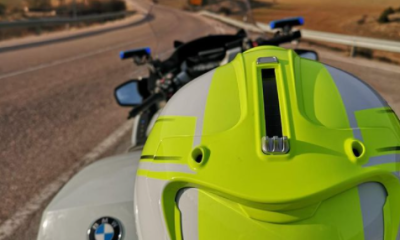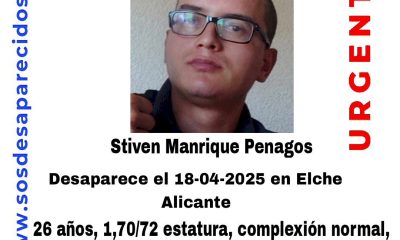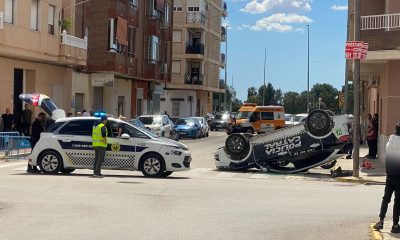Costa Blanca
17 arrested for people trafficking after the death of two Brits in a road accident
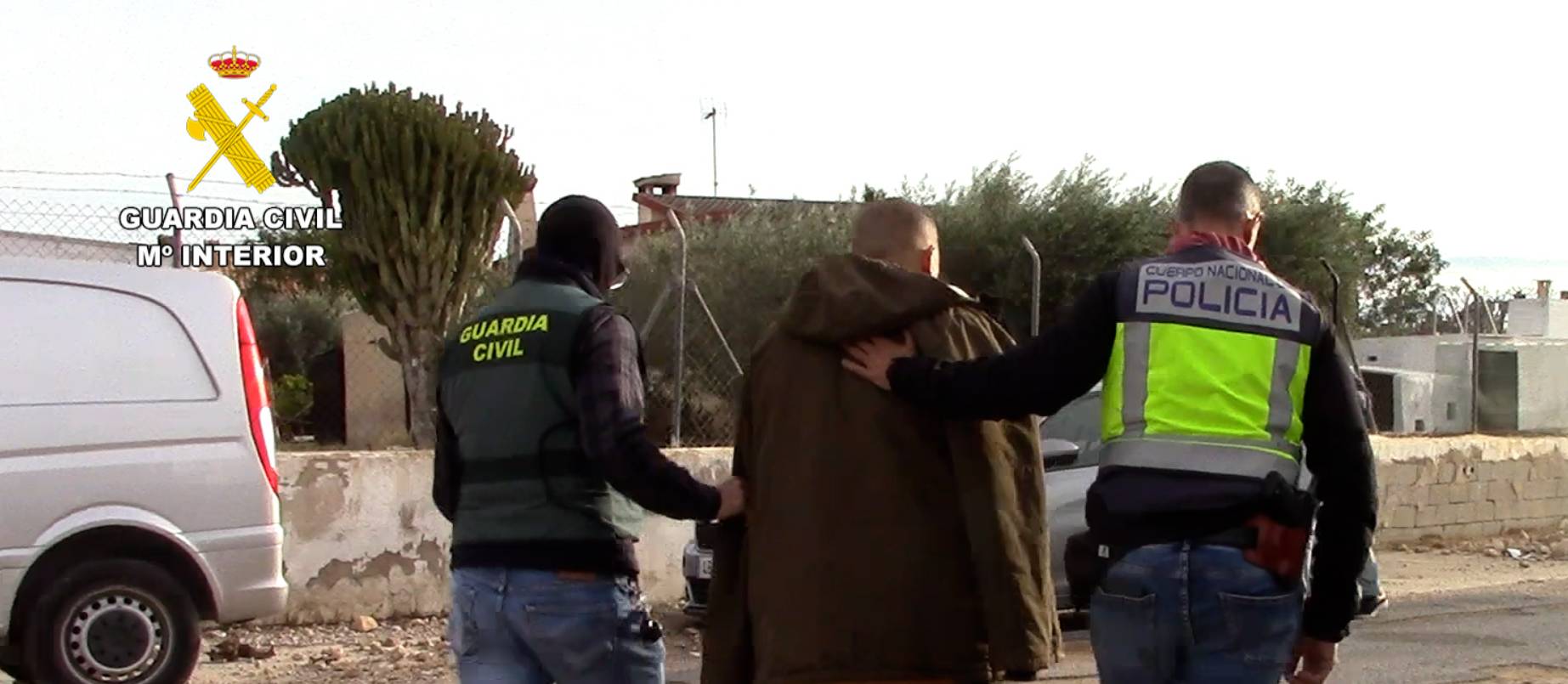
Following the deaths of two persons in a traffic accident on the La Manga del Mar Menor highway, National Police agents, working in tandem with the Civil Guard, have eliminated a criminal organisation that specialises in migrant trafficking.
Two persons were killed and eleven injured in the November 16th tragedy, which happened when a car blocking the road with a caravan that was towing a boat caused seven vehicles to collide.
17 persons have been taken into custody by agents on suspicion of belonging to a group that uses fast boats to encourage illegal immigration. Two cars, including the one involved in the fatal collision, two weapons, cell phones, beacons, and drugs were seized as a consequence of three searches conducted in Molina del Segura (Murcia), Elche, and Rojales.
The inquiry started on October 6th with the seizure of a rubber boat with a 150 HP engine and the arrest of three individuals by Civil Guard agents near kilometre 10 of the La Manga del Mar Menor road. A GPS, a satellite phone, 14 30-liter petrol canisters, bags, equipment, clothing and food were all confiscated from the boat.
Since then, the National Police and Civil Guard have been conducting a joint investigation, which has led to the discovery of a criminal organisation that reportedly planned to launch a small boat in the region.
Two British individuals lost their lives in a deadly accident.
An accident on the RM-12 route (El Algar-La Manga del Mar Menor), which runs through the municipality of Cabo de Palos-Cartagena, was reported to the Civil Guard one month later on November 16. When the authorities got there, they saw a number of automobiles colliding with an inflatable boat, resulting in a multiple accident. It appears that the accident happened when a car carrying a boat blocked the road with a trailer, causing seven automobiles to collide. Two British nationals, ages 49 and 57, were killed in the accident, and eleven others suffered injuries of various degrees.
The investigation’s main goal was to dismantle a suspected criminal network that was involved in the transportation of people and drugs across the Strait of Gibraltar after it was established that the vessel was a 10-meter inflatable boat with two 300 HP motors.
The brand and model of the car that was carrying the boat on the day of the collision, the location where it might have been concealed, and the driver’s name were all determined by investigators following multiple police investigations. The agents also found a number of residences connected to the criminal organisation they were investigating and were able to identify a number of individuals.
For the purpose of trafficking migrants, they employed swift boats with strong engines.
Although the structural damage was compatible with the accident, the inquiry found that the suspects had altered the registration number of the car used to transport the boat that resulted in the deadly collision on the La Manga road. The officers also discovered an electrical system that prevented the car’s front and back lights from turning on at the same time, allowing the driver to evade potential police monitoring.
According to agents, the disbanded organization’s primary activity was human trafficking, which involved moving people from North Africa to the Spanish coast via fast boats. Furthermore, they equipped themselves with stolen automobiles that they had fabricated license plates and paperwork for. They may make up to two journeys a day thanks to this innovative method of operation, which involves using high-quality boats (Phantom type) with powerful engines that cut the travel duration to about four or five hours.
In addition, the network was well-structured, with members clearly delineating their responsibilities. Some of them served as front men to give the boats the appearance of legality, while others were devoted to the preparation of the boats as well as the protection and custody of the pateras.
Three searches and 17 arrests were made in Molina de Segura (Murcia), Elche, and Rojales.
Ultimately, a sizable police force was used to carry out the operation on February 25th by operatives from the Civil Guard and the National Police.
17 people were taken into custody by the officers on suspicion of homicide, injuries, traffic safety violations, damage, abandoning the scene of an accident, illegal gun possession, drug trafficking, smuggling, document falsification, violating the rights of foreign nationals (by aiding illegal immigration), and membership in a criminal organisation.
Additionally, two cars, including the one that caused the deadly accident, a shotgun, a handgun, and ammunition were found during searches conducted in three homes in Molina de Segura (Murcia), Elche, and Rojales (Alicante). In addition, they confiscated almost 3,000 euros, 15 cell phones, beacons, various amounts of hashish and cocaine, and precision scales.
Discover more from Costa Blanca Daily
Subscribe to get the latest posts sent to your email.
Costa Blanca
Alicante couple arrested for trying defraud lottery winner out of 40,000€ with a fake 6€ ticket

In Alicante, National Police officers have arrested a 37-year-old man and a 42-year-old woman, who are purportedly involved in fraudulent activities. After successfully deceiving the proprietor into believing that the prize was only €6, the suspects attempted to cash in a lottery ticket valued at €40,000.
A citizen lodged a complaint alleging fraud, which prompted the investigation. She complained that she had acquired a lottery ticket and, the day following the drawing, visited a lottery kiosk to determine whether the ticket was eligible for a prize.
The seller informed her that the system was not functioning properly and that she could verify it using her mobile phone after verifying the ticket with the authorised ticket dispenser (POS). The vendor informed her that the ticket had a prize of six euros when she viewed it on the terminal.
For her part, the victim trusted the provided information and accepted the money without suspecting deception. At the same time, the seller retained the lottery ticket.
A few days later, the complainant discovered that the was infact worth 40,000 euros and that she had been deceived. She returned to the stand where she had checked the ticket to claim her prize, and the seller informed her that she was unaware of this and that she had thrown it in the bin.
Then, she proceeded to the authorised offices of the aforementioned lottery drawings to report the incident. Upon his arrival, she was instructed to submit a complaint regarding the events.
The agents verified that the coupon was indeed a prize after collecting all the information. The saleswoman confirmed on three separate occasions that she had retained the coupon after deceiving the complainant about the prize amount.
The investigation phase also disclosed that the lottery ticket had been attempted to be redeemed by the seller’s ex-partner. However, this was not accomplished due to the fact that the authorised collection offices were aware of the incident and the agents had requested that the payment of the prize be blocked.
The officers were able to corroborate that the seller and the individual who attempted to cash in the winning ticket were both involved in a fraudulent activity as a result of the investigations.
The investigators’ findings confirmed that the two suspects had reached an agreement to collect the winning ticket. They also discovered that the woman, a lottery seller, had deceived them by faking the malfunction of the POS machine and falsely informing the complainant that the prize was six euros.
Following the investigation and the collection of sufficient evidence to establish their involvement in the events, they were apprehended and charged with fraud.
The courts in Alicante were informed of the situation subsequent to the police investigation.
Discover more from Costa Blanca Daily
Subscribe to get the latest posts sent to your email.
Costa Blanca
Acquitted of fraud for keeping €75,000 deposit on Torrevieja house

The controversial failed sale of a home in Torrevieja in 2022 between two German citizens resulted in a judicial case. The Prosecutor’s Office and the private prosecution sought €77,000 in compensation and three years in prison for the defendant, the property owner, on the grounds that she had subsequently sold the house to another individual without returning the money paid.
Nevertheless, Orihuela Criminal Court No. 4 has granted the defendant’s acquittal, concluding that there was no criminal deception and that the facts should be resolved through civil proceedings.
The case was initiated by a failed private sale of a residence in the Los Balcones development in Torrevieja. The customer was unable to secure financing prior to the deadline stipulated in the contract. The public deed was never signed, despite the fact that €75,000 was paid in advance. The property was subsequently sold to third parties by the defendant, which resulted in the filing of a complaint for fraud.
Facts that have been verified
The defendant contacted the complainant in August 2022 to discuss the sale of the property. On August 13th, 2022, the defendant signed a reservation document, with a total price of €370,000 and a deed signing date of October 31st, 2022. She explicitly stated that the appointment with the notary would not be postponed beyond October 31st, 2022, and delivered over €3,000 in cash at that time.
The buyer and the spouse of the woman who has since been exonerated convened in Germany on August 21st to receive a cash payment of €57,000. Additionally, they consented to acquire the home furnishings for €4,000, with the injured party contributing €2,000 in cash.
The private sales contract was executed by the parties a week later. The initial stipulation of the contract required the buyer to pay €15,000 within three weeks. The transaction was finalised on August 30th, 2022. The complainant was awaiting financing for the remaining quantity of €295,000.
Similarly, the initial stipulation explicitly stated that “the remaining portion of the agreed price will be paid upon the signing of the public deed of sale.” The aforementioned signature is scheduled for October 31st, 2022. The deposit money would be forfeited in the event of the buyer’s cancellation, and it would be transferred to the vendor. Double the deposit would be reimbursed to the customer by the seller in the event of contract cancellation (Art. 1454 CC).
The defendant, who has since been acquitted, executed a deed of sale of the property to third parties on July 25th, 2023. There is no record of the return of the €75,000 she was claiming, and there is insufficient evidence that she did so without prior dissolution of the signed contract or notification to the complainant.
Nevertheless, the Court determined that the dispute did not satisfy the criteria of Article 251.2 of the Criminal Code, which required criminal deception, and classified it as a civil dispute.
In the ruling, the judge explicitly enquires, “Where is the deception that the type requires?” He notes that the buyer was informed that the property would be relisted if he failed to secure financing in a timely manner, which subsequently transpired.
In order to underscore that frauds that are subject to Article 251 of the Criminal Code must also entail a minimum level of deceptive manoeuvring, the ruling incorporates updated references from the Supreme Court, such as the most recent Supreme Court ruling, 631/2024.
The judge in this instance has determined that “a failed sale as a result of insufficient financing cannot be criminalised.” María Barbancho Saborit, the defendant’s attorney, stated, “These types of rulings reinforce the notion that not all economic disputes are criminal.” “It is imperative to distinguish between breaches of contract, which are inherent in civil matters, and truly criminal conduct and preserve the presumption of innocence.”
The decision is not conclusive and may be appealed to the Alicante Provincial Court. Numerous witnesses, including those from the vendor, the defendant’s family, and professionals involved in the purchase and sale process, were presented during the trial, in addition to a substantial amount of documentary evidence.
Discover more from Costa Blanca Daily
Subscribe to get the latest posts sent to your email.
Costa Blanca
Easter traffic operation ends with at least 22 deaths
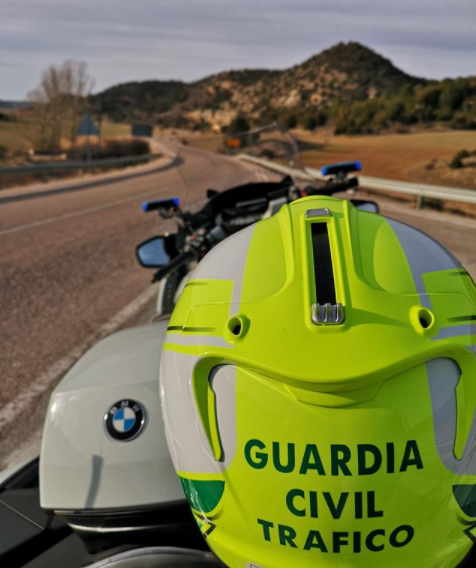
It starting at 15:00 on Friday April 11th, the special traffic operation for Holy Week and ended at midnight last night. A minimum of 22 individuals have died on the roads in Spain.
According to data from the General Directorate of Traffic, there were 21 fatal incidents on the intercity road network as of 8 p.m. on Easter Sunday, resulting in 22 fatalities.
Last year, 28 individuals lost their lives on the highways during the entire Holy Week.
Discover more from Costa Blanca Daily
Subscribe to get the latest posts sent to your email.
-
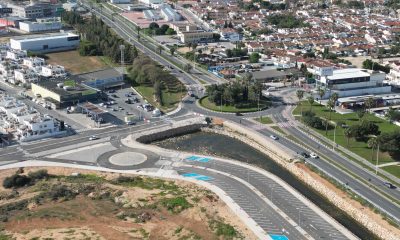
 Costa Blanca2 days ago
Costa Blanca2 days agoTorrevieja fails to comply with its commitment to open new road at La Hoya for Easter
-
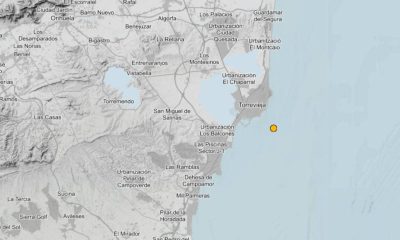
 Costa Blanca1 week ago
Costa Blanca1 week agoTorrevieja records a 2.8 magnitude earthquake
-

 Costa Blanca2 weeks ago
Costa Blanca2 weeks agoSpanish family killed in helicopter crash in New York
-

 Costa Blanca2 weeks ago
Costa Blanca2 weeks agoA car fire on the Orihuela Costa is promptly extinguished by firefighters
-

 Costa Blanca1 week ago
Costa Blanca1 week agoThe Alicante Tourist Board website now available in seven languages
-
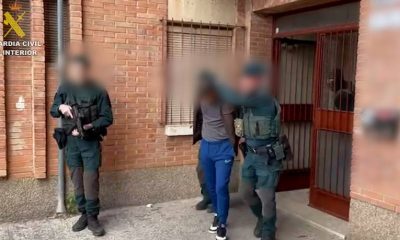
 Costa Blanca5 days ago
Costa Blanca5 days agoArrested in Murcia for activities linked to jihadist terrorism
-

 Costa Blanca2 weeks ago
Costa Blanca2 weeks agoElche residents rescued after a fire caused by an electric scooter
-

 Costa Blanca2 weeks ago
Costa Blanca2 weeks agoSuspect held for the murder of John George extradited to a Spanish prison





